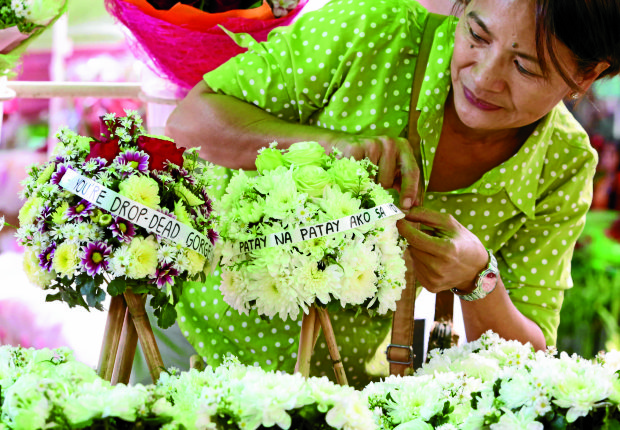Couples can’t afford high wedding cost

UNDYING LOVE Florist Jo Calderon gets creative in her shop in Taguig City by pinning humorous love messages on her miniature wreaths for sale on Valentine’s Day. —MARIANNE BERMUDEZ
(Third of a series)
The high cost of tying the knot is pushing the middle class and the poor to either postpone or forgo outright getting married.
Helen Mantuhac’s son has been living with a girlfriend for three years in Liloan town in Cebu province. They have a 3-year-old child, but wedding bells are not about to ring soon.
Marriage plans depend on the amount of money the family could earn from raising pigs due to the pressure of throwing a big wedding feast, according to Mantuhac.
“It’s just part of our tradition and culture, especially in a small, tight-knit community. We need to invite relatives and that means the entire barangay because everyone is related,” she said.
Article continues after this advertisementFree mass weddings may not be enough enticement for the poor to get married because of the attendant costs.
Article continues after this advertisement“Even if the Catholic Church sponsors free kasalang bayan, that still means paying the costs of feeding the nuclear and extended families and close friends,” said Mary Racelis, a professional lecturer of sociology and anthropology at Ateneo de Manila University and the University of the Philippines.
Too expensive
Racelis said a “civil wedding would be less lavish but would call for at least a modest celebration, which many couples may not be able to afford, or for which they do not want to use their limited savings.”
That’s why Maricel Merilles and her boyfriend, who have been living together for two years, plan to get married one day before a mayor or a judge.
“Church weddings are too expensive,” Merilles said.
The high cost, along with other factors like the growing acceptance of cohabitation, urbanization and absence of a divorce law, has contributed to the 30-percent decline in the number of registered marital unions in the country from a peak of 593,553 in 2003 to 414,325 in 2015.
Merilles, a house help, and her boyfriend, a painter working for a construction firm, want “to save first” before exchanging wedding vows.
Asked how much they’re trying to save, Merilles said: “Five.”
“Five hundred thousand?” the Inquirer asked. “No, five thousand pesos,” she replied.
Saving up not only for a wedding but also for a house keeps Patrick Tengco and his girlfriend of 12 years, Karen Ramos, from getting hitched.
Tengco, 35, who works as a systems analyst in Singapore, said he wanted to give Ramos, 30, her “dream wedding.”
Something grand
Aware that his girlfriend wanted something grand, a destination wedding even, either in Boracay, Tagaytay City or Palawan province, he said, “I’ll try my best to fulfill that.”
Tengco said he and his girlfriend felt they had to save up enough money before committing to marriage because of the costs, including the wedding reception, which can cost hundreds of thousands of pesos.
“And since we want an out-of-town wedding, we also have to consider the airfare tickets and hotel accommodations of our guests,” he added.
Apart from a grand wedding, Ramos, who sells cupcakes she herself bakes at home, said she and her partner were saving to buy a house since they did not want to rent or live with their parents.
“With what we are both earning, we cannot afford the wedding that we want. So while we always knew we’d get married, saving up for the wedding itself and a house was just a higher priority,” said Tengco, who grabbed the opportunity to work abroad in 2015.
Memorable, special
“I feel that since getting married is a once-in-a-lifetime event, I want the best. I want it to be memorable and special,” said Ramos, who is dreaming of hiring a famous designer for her gown and a popular photographer-videographer to capture the most important milestone in their life as a couple.
For still being single, Ramos said she was always the center of attention at family gatherings, constantly being asked when she was getting married.
“I always tell them, ‘We’ve managed to wait for 12 years, let’s wait a little more,’” she said.
For a number of other professionals, “financial stability” is a primary condition for getting married.
Pau, 25, who works as an executive assistant, said she and her boyfriend wanted to save up first for their future.
Her sentiment is echoed by Paolo, 27, who has been with his girlfriend for five years. “We’re still saving up,” he said.
Gerald, 22, thinks marriage needs careful planning, and requires financial and emotional stability.
Mikee Rivera, 24, also believes that emotional and financial stability are requirements for marriage. The software developer thinks she’ll consider settling down in four or five years, “when I’m mature enough and I’m able to provide for my family’s needs.”